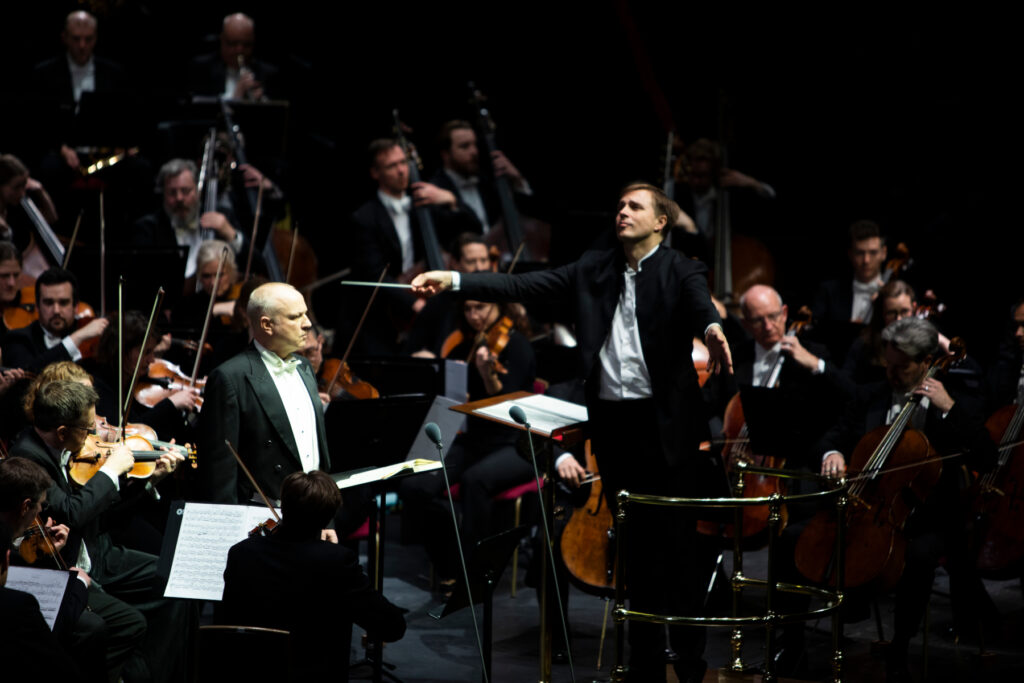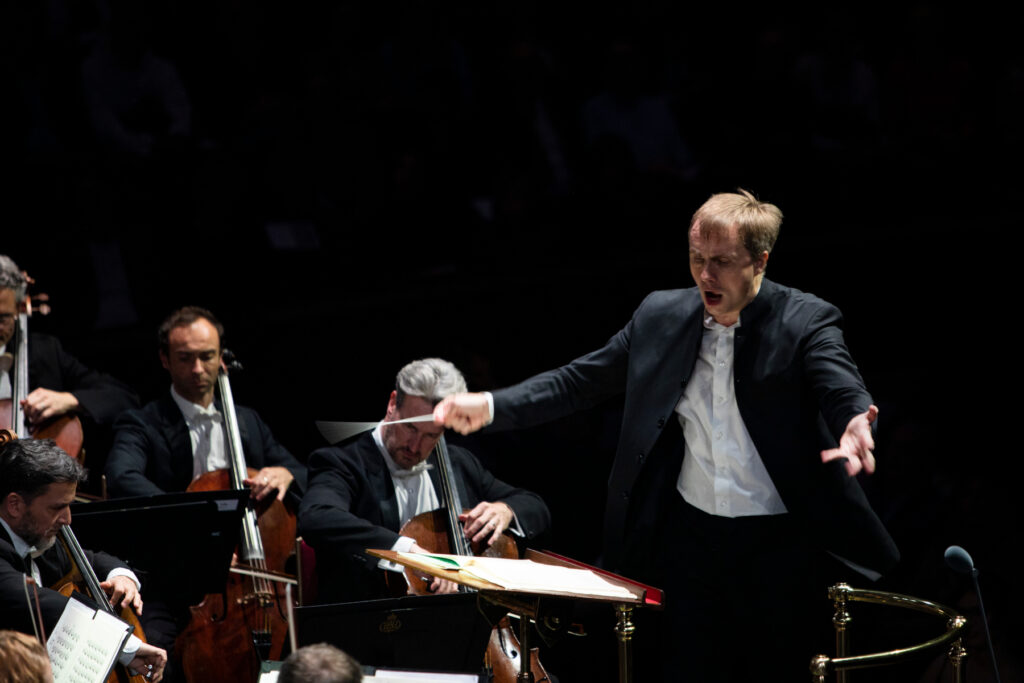In May 1877, Richard Wagner brought to London, for eight concerts, what would become known as Wagner’s Grand Festival. The year before, Der Ring des Niebelungen had been heard for the first time in its full four-opera cycle at the newly opened Bayreuth opera house and it had been a financial disaster. The concerts at the Royal Albert Hall, which played to capacity audiences, were in large part done to recoup some of those financial losses; these too made a loss.
Wagner was by this stage 64 years old and only took to the rostrum each evening to conduct the first work on the program; the rest were conducted by Hans Richter. To satisfy the large audiences, Wagner sat in an armchair and watched from the side of the stage. If the audiences raved about the concerts, the critics were more muted. For George Bernard Shaw the orchestra (seemingly by his account an absolutely vast one) were ill-prepared – and Wagner himself condemned to listen to it.
The Royal Philharmonic Orchestra’s Icons Rediscovered: Wagner’s Grand Festival recreated this event and, if not everything quite worked for me, it was still a superb evening of Wagner. Once upon a time, bleeding chunks of Wagner, as Donald Tovey described it, were more popular than they are today. And they can be memorable, or they clearly can’t. I do remember Klaus Tennstedt doing one; I do not recall who the conductor was who did one rather more recently than Tennstedt at all.

Vasily Petrenko is not a born Wagnerian – but neither does he show no gifts for conducting this composer either. He doesn’t linger as some conductors are apt to do; and he sees the dramatic scale of the works, even if they are not exactly in a full-scale operatic context. Thankfully, some of the purely orchestral pieces flew by; butchered meat, as Tovey might have had it, isn’t always cut from the best of joints. I doubt many in the hall would have been that familiar with the opening work, the Huldigungsmarsch. Written as a birthday present for Wagner’s patron King Ludwig it steals its themes from Lohengrin and Tannhäuser with the traditional militarism of the march only entering later. If it feels more opulent and grander – and simply more regal – then that is Wagner’s intention, its homage to the young king more than implied in the music. There were early signs in the performance of the solid brass playing that was to feature throughout this concert and a richness in the strings – although one might have wished for slightly more heft from the violins.
Swiftness is not necessarily a wise thing for the Act I Prelude to Die Meistersinger. We could have done with a lot more of that heft in the strings for sure although the brass were as solid as concrete yet mellifluous in tone. But this wasn’t by any means a measured performance. Hans Sach’s Act II “Was duftet doch der Flieder” is, of course, his reply to Walther’s Prize Song and it is wide-ranging enough to touch on Sachs’ admiration for the young Walther, his growing anger at the rejection of the song by the mastersingers and the cobbler-poet’s own love of the seasonal Spring. What the bass-baritone Derek Welton lacks in an ideal depth of tone he more than makes up for in a quite remarkable ability to interpret what he is singing. Perhaps what was riveting here was the clarity of subtext, the near-perfect stress on making so obvious both the devotional and the bitter in singing that was hugely poetic.
Welton’s Wotan from Die Walküre, too, was generally lighter than I might have wished for – but here we were really tossing a coin. I have certainly heard much darker Wotan’s who have got almost nothing out of the long ‘Farewell’. Welton, on the other hand, makes one want to hear him sing the entire role so profoundly does he get inside this complicated character. This did not feel in the slightest like an ‘Abschied’ which came from nowhere – it felt entirely as if it was coming from everything that had happened before it. Its poignancy bore all of his rage at Brünnhilde, and yet there was remorsefulness for what her punishment should be and his conflicted love for his daughter. If some singers have a more limited ability to use what balance and tone they have in their voice to convey all this, Welton had it all and more. Petrenko never allowed the orchestra to overwhelm the voice – and if I found the playing just a little on the placid side this might not have been the case at all had I not recently been reviewing a new remastering of Otto Klemperer’s New Philharmonia recording. This music can almost always sound as if it has been carved from granite; what differs is how the chisel has been used against it.
A swirling and positively energetic ‘Ride of the Valkyries’ preceded this – although these days no matter how thrilling the performance I can’t escape the view that this is Wagner at – or close to – his worst.

The second half was given over to just one opera – Götterdämmerung. Much of this hour or so of music was wonderfully done, the Royal Philharmonic’s playing richer, darker and more secure (except for a very brief moment on trombones during ‘Siegfried’s Funeral Music’). ‘Dawn’ can meander a little somewhat, but here it was fleet – as was ‘Siegfried’s Rhine Journey’ with a gorgeous, ringing off-stage horn call. The Act III ‘Duet’, if neither intended to rival those between Siegmund and Sieglinde, or Tristan and Isolde, or even reach the same heights of incandescence, nevertheless needs a pair of equals. Peter Wedd’s Siegfried was of the heldentenor kind – there was absolutely no weakness in the power of the voice, nor its range. It is as solid from the low end of the register right up to top C. Rachel Nicholls’ Brünnhilde didn’t lack power either, despite the fact she must have found it slightly difficult singing as comfortably as she might have wished with her right arm held in a sling. There is, perhaps, a little imbalance in this duet – Brünnhilde gets rather more to sing about their love for each other than Siegfried does. Yet, if this imbalance is in part a metaphor for the distance that exists between the two lovers it also produced something of an anomaly in this performance. Wedd’s Siegfried sounded considerably the more dominant of the two, his echoes rather more emphatic; in part it slightly upended a more conventional performance of the duet. Rather than Brünnhilde riding over the orchestra here, one often thought that it was Wedd who was holding the reins (which in a sense he is, of course, since Brünnhilde has given him Grane). There was no doubting that the climaxes were thrilling, however.
I have heard more shattering performances of ‘Siegfried’s Funeral Music’ than the one that Petrenko gave us. Possibly the cavernous acoustic of the Albert Hall just made its menacing depth disappear – neither strings, nor low woodwind, were quite as tragic, nor as threatening, as they should have been. Brünnhilde’s ‘Immolation Scene’ was largely extremely fine, however. Nicholls began very strongly but a wide – if not particularly unsteady – vibrato pushed the voice a great deal. Nicholls can hit the high notes with ease – but I’m not sure Brünnhilde should have sounded quite this vulnerable, or quite this uncertain when the flames are burning and consuming Valhalla around her. But the architecture and span of this vast scene were entirely within her grasp, its narrative spellbindingly done. Petrenko and the orchestra were a perfect shadow to their soloist – giving just enough brightness and depth to cover her voice when the music demanded it. When the Ring’s curse is itself broken, and the world is renewed, the end of the opera arrived with shattering force – and at the right kind of tempo we may have been wanting all evening it took us back to where it all began.
Marc Bridle
Icons Rediscovered: Wagner’s Grand Festival
Richard Wagner:
Huldigungsmarsch; Die Meistersinger von Nürnberg: Prelude to Act I, Was duftet doch der Flieder; Das Rheingold: Abendlich strahlt der Sonne Auge; Die Walküre: Ride of the Valkyries, Wotan’s Farewell and Magic Fire Music; Götterdämmerung: Prologue – Dawn, Duet and Siegfried’s Rhine Journey, Siegfried’s Death and Funeral Music, Brünnhilde’s Immolation and Finale.
Rachell Nichols (soprano), Peter Wedd (tenor), Derek Welton (bass-baritone), Royal Philharmonic Orchestra, Vasily Petrenko (conductor)
Royal Albert Hall, 13 March 2024
All photos © Frances Marshall